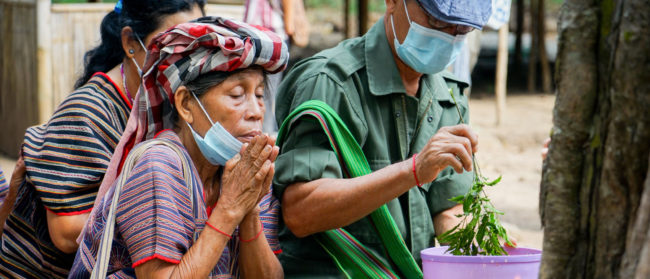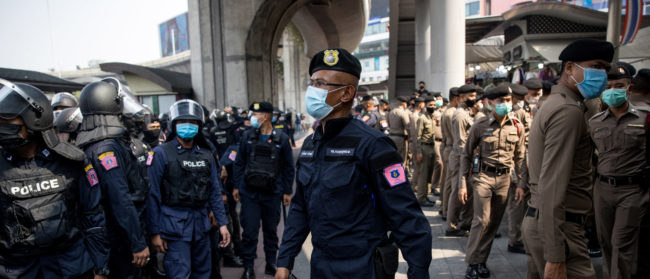The Covid-19 pandemic has done considerable damage to the Thai economy and has been one of the major catalysts for political grievances with the government that erupted into widespread protests last year.
While Thailand’s pro-democracy, pro-reform movement is set to resume protests against the political status quo – albeit in different form due to Covid-19 restrictions – Thais from all walks of life face continued economic crises with national economic activity in freefall. Last year, the Thai economy contracted 10%, with a modest 3% to 4% increase in 2021 predicted before the virus outbreak in Samut Sakhon province. Thailand’s economy hasn’t experienced an economic contraction of similar proportion since the 1997 Asian economic crisis.
Of course, the Thai economy was facing severe troubles before Covid-19, with exports sharply down amid a growing US-China trade war. The tourism-dependent Thai economy for 2021 is bracing for additional hardship, with the Tourism Authority of Thailand (TAT) predicting foreign arrivals as low as 6.1 million, down from almost 40 million in 2019.
While 2021 portends to be another rocky year, the military-backed government could do itself some favours, both in the short term by reducing political tensions, and in the long term through the consideration of economic policies that would reduce Thailand’s historically-high rate of inequality.
The pandemic has only exacerbated Thailand’s long-standing issues of inequality and high household debt. A number of media sources have reported that Thailand’s household debt has reached well over 80% of GDP, all while more than 36% of corporate equity in Thailand is concentrated in the hands of just 500 people – each of whom have on average amassed 3.1 billion baht (roughly $100 million) in company profit annually, according to the Puey Ungphakorn Institute for Economic Research.
This stands in contrast to the more than 69 million Thais whose average household income is around $10,000 per year. So pervasive is inequality that it also stretches beyond income into less visible aspects of life, such as access to education and employment opportunities.
Inequality in terms of access to Thai universities has increased dramatically in recent decades, crippling social mobility and contributing to greater income inequality across generations of Thais
Attempts to reform education in Thailand have resulted in a long string of failures that date back to the 1960s. When Thailand’s post-war economy was stimulated as a result of industrialisation and improvements to national infrastructure, investment in education was mainly concentrated in Bangkok and other urban areas. Economic growth and increased spending on education did not open universities to Thailand’s rural poor, resulting in exclusion from economic opportunities that would lead them away from low-paid, low-skilled forms of employment.
Today, while Thailand spends on average the same amount that most countries do as a percentage of GDP on education, that spending has yet to yield results. Inequality in terms of access to Thai universities has increased dramatically in recent decades as the gap between the rich and the poor has widened, crippling social mobility and contributing to greater income inequality across generations of Thais.
Calls for education reform have come from the current generation in the form of the “Bad Student” movement, who have tried to use social media and forms of public theatre to expose flaws in the Thai system. Structural reforms have all failed, with multiple aspects of education crumbling, from worse English proficiency than other ASEAN countries like Vietnam and Indonesia, and lower than average standardised test scores, PISA scores and more.

Thailand has been given advice on this front in the past that hasn’t been followed, or the government has been slow to implement many of the recommendations given.
The World Bank in early 2019 advised Thailand to consolidate small schools in an effort to improve quality. Small Thai schools face a number of challenges, from lower enrollment, a shortage of teachers and equipment and more. Because of this, the World Bank notes that over 12 years of schooling for a Thai child is equivalent to just 8.6 years – a significant learning gap to overcome. Reducing the number of small schools is a first step, but the Ministry of Education has to work faster to combine the vast number of schools with under 120 students, which total over 10,000 across the kingdom.
Other reform proposals are as old as the Thai curriculum itself. Contradictory, yet just as promising, is decentralisation, which would mean that rural communities that want better education for their children would not be at the mercy of a centralised Ministry that dictates everything from the curriculum (which is ancient), to the hiring of teachers, and more.
The dangers of inequality in education are real. A 2019 report by the National Statistical Office and UNICEF showed that there are 160,000 children in Thailand that cannot be educated because they live in remote locations. Others are locked up because they have gotten into drugs and crime. Almost 400,000 children live on the streets because they are the sons and daughters of migrants.
Thailand requires solutions to complex challenges in education. But decentralisation of the Thai education system, which hasn’t had any political momentum under the current government or the junta, should begin immediately.
Income and wealth inequality in Thailand are also the byproduct of rapid industrialisation in the mid-20th century. Thailand soon developed a large informal sector, with workers isolated from social services or the extremely limited resources that state welfare could provide. Today these issues have widened and deepened, where household income has stalled, with most of the declines among households on the bottom rungs.
The solutions to this income and wealth inequality lay with both the private sector and the state. A prime example of inequality producing enterprise is the Eastern Economic Corridor (EEC), a special economic zone established in 2017 as part of the government’s ongoing “Thailand 4.0” national development master plan.
With a focus on innovation and technology to drive productivity and produce economic growth, the EEC aims to link Chachoengsao, Chonburi and Rayong provinces as industrial hubs to Cambodia, Lao PDR, Vietnam and Myanmar. The Thai government hopes the EEC can move the country out of the middle-income country trap.
However, there is reason to worry that the focus on high technology and innovation will only deepen inequality. The reason being is that only a small portion of the population will benefit from the changes that EEC will bring and that change will force certain low-tech industries to adjust or even decline. In short, those with the advanced technical skills will benefit the most – foreigners at first – followed by high-skilled workers or those with access to higher education.
The current political protests have exposed deep – and justified – economic cleavages between the ruling and political class and a new generation of Thais
The Thai government also should address its highly regressive nature of taxation. The easiest example is the VAT, which claims more by percentage of income from the poor than it does from the rich.
Past and current regimes are guilty of tax regimes that benefit the rich. Former Prime Minister Yingluck Shinawatra introduced a cut to personal income taxes, which gave a 5% reduction to those earning between 150,000-300,000 baht, but also an arguably unjustified 2% reduction for those making more than 4 million baht – some of Thailand’s highest earners.
Income-based taxation as well as corporate income taxes make up about 42% of Thailand’s total tax revenue. However, the benefits of Thailand’s tax system are highly biased in favour of the wealthy, such as investments in mutual funds that reduce personal income taxes. There are numerous and complicated laws in Thailand that rich people take advantage of – and advantages the poor cannot access.
As Thailand’s economy becomes more diversified and hopefully breaks out of the middle-income trap, new approaches to and methods of taxation will need to be devised to ensure that the poor reap some of the benefits of a modernised economy, in the form of a stronger social safety net or a more progressive method of taxation.
Most importantly, the issue of inequality could be used to mitigate some of the political tensions that Thailand has become accustomed to over the past two decades. The current political protests have exposed deep – and justified – economic cleavages between the ruling and political class and a new generation of Thais. Evidenced by the extraordinary wealth possessed by Thai King Maha Vajiralongkorn, the accumulation of assets by Prime Minister Prayut Chan-o-cha, and Deputy Prime Minister Prawit Wongsuwon’s penchant for extravagance and luxury in his string of political scandals.
Inequality is also an issue that can galvanise political opposition – as evidenced by Covid-19 related frustrations and secondary school students hanging their uniforms on the gates of the Ministry of Education in protest. Inequality could become a unifying issue, but seems a non-starter to the entrenched status quo.
Mark S. Cogan is an Associate Professor of Peace and Conflict Studies at Kansai Gaidai University in Osaka, Japan. He is a former communications specialist with the United Nations in Southeast Asia, Sub-Saharan Africa, and the Middle East.


